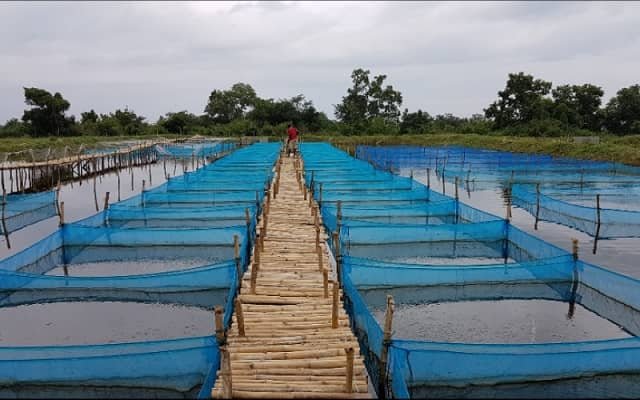Domestication of the oceans is widely regarded as a possible solution to increase food and could be one of the next most important developments in human history. By 2050, the edible bioresource biomass will have to satisfy the 9 billion people predicted to live on the planet. Seaweed aquaculture can help to address global challenges related to nutrition, health and sustainable circular bio economy. Today, there is growing need for development, improvement and diversification of seaweed aquaculture practices in Europe, a continent characterised by its large coastal territory and large range of climates.
Seaweed are plant-like organisms, playing a key ecological role in coastal ecosystems: support of food web, coastal protection of erosion, bioremediation by removal of nitrogen or phosphate and possible pollutants and CO2 sequestration. Although European marine flora displays one of the highest species-diversity levels in the world, its commercial production is still in its infancy, with only 1% of the world’s production from which less than 1% was coming from aquaculture in 2016. Interest in seaweed-based industrial applications is on the rise. The estimated value of the global seaweed production industry is more than ~ 8B€ (for 30Mt) and is continuing to expand. Seaweed are thus a promising bioresource for the future and the demand for high-value seaweed-derived compounds (cosmetics, food) is growing in Europe. However, the European production lags behind Asian countries despite its large exclusive economic zone, its high seaweed biodiversity and its international leadership in fundamental research on seaweed genomics, genetics and cutting-edge techniques.
Therefore, European industries involved in the development of sustainable seaweed aquaculture need to be supported. In this context the multidisciplinary COST Action Phycomorph, composed of scientists expert in seaweed is now publishing a guide called: PHYCOMORPH EUROPEAN GUIDELINES FOR A SUSTAINABLE SEAWEED AQUACULTURE, PEGASUS. The 200p technical document highlights the current state of European seaweed production and pinpoints challenges for the development of this sector in the current European context. It proposes recommendations for short-term and long-term improvements at different levels of the chain.
Namely, PEGASUS provides inter alia, guidelines with fine details on the status quo, best practices, legislation and regulations that currently apply to the production with a focus on consumption of seaweed as food or food supplement. It also proposes a state of the art of the current scientific knowledge regarding the biology and physiology of seaweeds, the possible pest and disease breakouts, and how this biological knowledge could meet the identified industry needs. PEGASUS strongly supports aquaculture practices that guarantee a high level of preservation of EU wild environment and biodiversity.
Overall, PEGASUS should be considered as scientific advice to help all stakeholders in the sector to understand the different aspects of seaweed aquaculture that need to be considered. To boost the sustainable development of seaweed aquaculture in Europe, harmonisation of legislation and management frameworks on many factors impacting the sector should be undertaken across Europe. This includes the rules of seaweed cultivation, the environmental protection, the assessment of the risks of a loss of biodiversity and the marine-water quality. It encourages the mutual collaboration of all stakeholders – industry, farmers, researchers and policy-makers – for the establishment of European strategic-development plans.
As such, PEGASUS has been presented to the Searica (Seas and Coastal Areas Intergroup) group of the European Parliament in February 2019 to stress the need to boost the sustainable development of seaweed aquaculture in Europe and suggest future directions to be followed by policymakers.
Reference (open):
Michèle Barbier, Bénédicte Charrier, Rita Araujo, Susan L. Holdt, Bertrand Jacquemin & Céline Rebours (2019) PEGASUS – PHYCOMORPH European Guidelines for a Sustainable Aquaculture of Seaweeds, COST Action FA1406 (M. Barbier and B. Charrier, Eds), Roscoff, France. https://doi.org/10.21411/2c3w-yc73 http://www.phycomorph.org/doc/PEGASUS_PHYCOMORPH_GUIDELINES_SEAWEED_AQUACULTURE_COST_ACTION.pdf
Source: COAST
Editor at the digital magazine AquaHoy. He holds a degree in Aquaculture Biology from the National University of Santa (UNS) and a Master’s degree in Science and Innovation Management from the Polytechnic University of Valencia, with postgraduate diplomas in Business Innovation and Innovation Management. He possesses extensive experience in the aquaculture and fisheries sector, having led the Fisheries Innovation Unit of the National Program for Innovation in Fisheries and Aquaculture (PNIPA). He has served as a senior consultant in technology watch, an innovation project formulator and advisor, and a lecturer at UNS. He is a member of the Peruvian College of Biologists and was recognized by the World Aquaculture Society (WAS) in 2016 for his contribution to aquaculture.
Stay Always Informed
Join our communities to instantly receive the most important news, reports, and analysis from the aquaculture industry.







